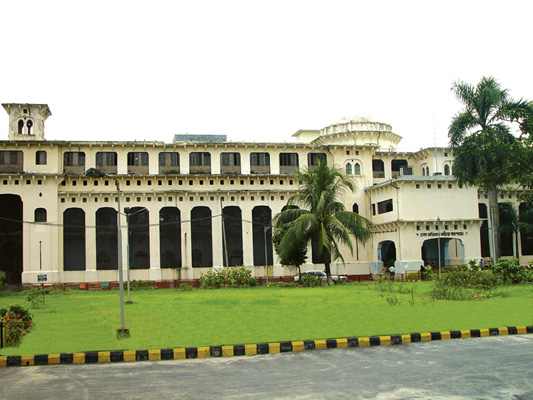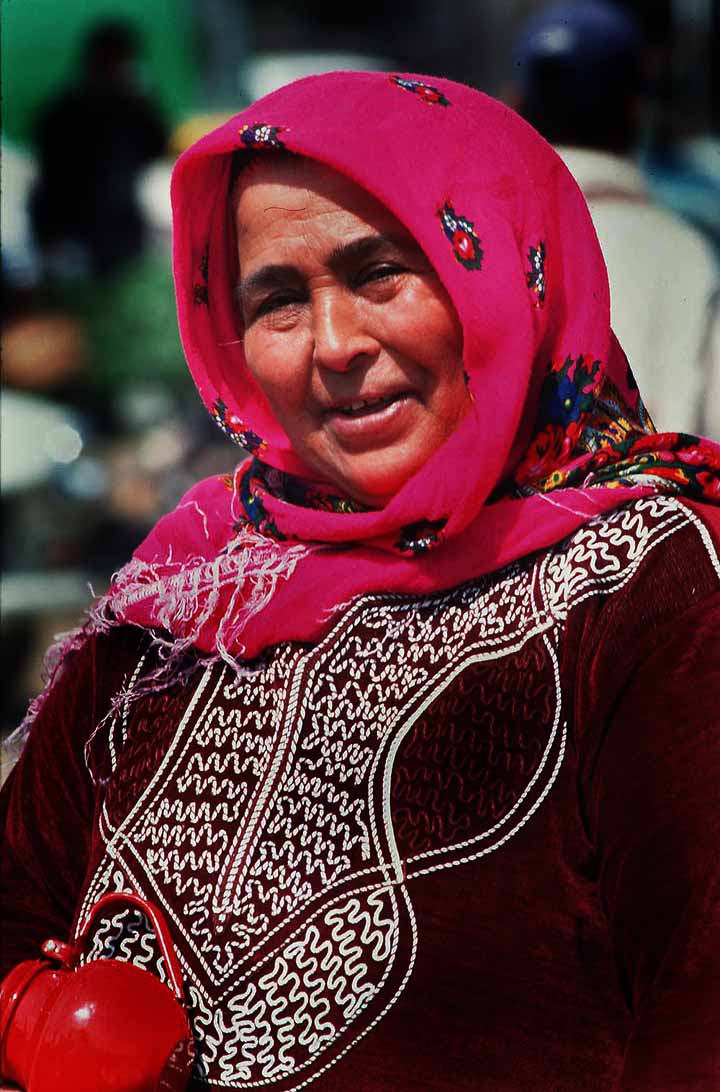|
Nadia Sharmeen
Nadia Sharmeen (Bengali: নাদিয়া শারমীন) is a Bangladeshi journalist. In 2015, she won the US State Department's International Women of Courage Award. Biography From the time she was in Middle School, Sharmeen wanted to become a journalist. In 2009, she joined the Bangladesh press corps and became a crime reporter. In 2013, Sharmeen was covering an Islamic rally for her employer Ekushey Television, when she was attacked by the Hefazat-e-Islam activists. The rally was being held to demand restrictions on the open association of males and females in the same space, punishment of atheists, wearing of scarves by women, and other religiously based precepts. The Hefazat activist's 13-point demand list specifically called for the government to abandon the current Women's Policy, which had been designed to create gender equality. While there were no reported incidents of violence between activists and police, journalists were attacked and tortured in many places ... [...More Info...] [...Related Items...] OR: [Wikipedia] [Google] [Baidu] |
International Women Of Courage Award
The International Women of Courage Award, also referred to as the U.S. Secretary of State's International Women of Courage Award, is an American award presented annually by the United States Department of State to women around the world who have shown leadership, courage, resourcefulness, and willingness to sacrifice for others, especially in promoting women's rights. History The award was established in 2007 by United States Secretary of State, U.S. Secretary of State Condoleezza Rice on or near the International Women's Day, an annual celebration observed each March 8 in many countries worldwide. Each United States embassies, U.S. embassy has the right to recommend one woman as a candidate. As of 2021, the award has been given to over 155 recipients from about 75 different countries. Award recipients by year 2007 *Ruth Halperin-Kaddari of Israel *Jenni Williams, Jennifer Louise Williams of Zimbabwe *Siti Musdah Mulia of Indonesia *Ilze Jaunalksne of Latvia *Samia al-Amoudi ... [...More Info...] [...Related Items...] OR: [Wikipedia] [Google] [Baidu] |
Bangabandhu Sheikh Mujib Medical University
Bangabandhu Sheikh Mujib Medical University (BSMMU) is a graduate medical university in Bangladesh. It was established in 1965. The university offers postgraduate degrees only, not offering undergraduate medical or dental degrees. History Establishment of the Bangabandhu Sheikh Mujib Medical University was an upgrade of the Institute of Postgraduate Medicine and Research (IPGMR). IPGMR was established in December 1965, as a Government-controlled postgraduate institute for medical research and studies. It was housed in the now defunct Hotel Shahbag, once the biggest hotel in Dhaka. The neighbourhood got its name Shahbag from the name of the hotel. From 2010, many of the medical and public health colleges/institutes have become affiliated to BSMMU. For example BIRDEM, BIHS, DMC, SSMC, NICVD, NITOR and others. It was renamed as Bangabandhu Sheikh Mujib Medical University by the Act 1, 1998 of Jatiyo Sangshad after the first President of Bangladesh, Bangabandhu Sheikh Mujibur ... [...More Info...] [...Related Items...] OR: [Wikipedia] [Google] [Baidu] |
Bangladeshi Women Journalists
Bangladeshis ( bn, বাংলাদেশী ) are the citizens of Bangladesh, a South Asian country centered on the transnational historical region of Bengal along the eponymous bay. Bangladeshi citizenship was formed in 1971, when the permanent residents of the former East Pakistan were transformed into citizens of a new republic. Bangladesh is the world's eighth most populous nation. The vast majority of Bangladeshis are ethnolingustically Bengalis, an Indo-Aryan people. The population of Bangladesh is concentrated in the fertile Bengal delta, which has been the center of urban and agrarian civilizations for millennia. The country's highlands, including the Chittagong Hill Tracts and parts of the Sylhet Division, are home to various tribal minorities. Bengali Muslims are the predominant ethnoreligious group of Bangladesh with a population of 150.36 million, which makes up 91.04% of the country's population as of 2022. The minority Bengali Hindu population made up appr ... [...More Info...] [...Related Items...] OR: [Wikipedia] [Google] [Baidu] |
Living People
Related categories * :Year of birth missing (living people) / :Year of birth unknown * :Date of birth missing (living people) / :Date of birth unknown * :Place of birth missing (living people) / :Place of birth unknown * :Year of death missing / :Year of death unknown * :Date of death missing / :Date of death unknown * :Place of death missing / :Place of death unknown * :Missing middle or first names See also * :Dead people * :Template:L, which generates this category or death years, and birth year and sort keys. : {{DEFAULTSORT:Living people 21st-century people People by status ... [...More Info...] [...Related Items...] OR: [Wikipedia] [Google] [Baidu] |
One Billion Rising
One Billion Rising is a global campaign, founded by Eve Ensler, to end rape and sexual violence against women. It was started in 2012 as part of the V-Day movement. The "billion" refers to the UN statistic that one in three women will be raped or beaten in her lifetime, or about one billion. The campaign expands each year. In 2016, the theme of the campaign is Rise for Revolution. "This year's campaign will escalate the collective actions of activists worldwide, and amplify their call for systematic changes towards ending violence against women and children once and for all," said OBR global director Monique Wilson. Founding The campaign was initiated by playwright and activist Eve Ensler (known for her play ''The Vagina Monologues''), and her organization V-Day. It was partly inspired by Missouri congressman Todd Akin's "legitimate rape" and pregnancy comments. Shocked by Akin's remarks, Ensler wrote an open letter in response. History 2012 In 2012, the One Billion Risi ... [...More Info...] [...Related Items...] OR: [Wikipedia] [Google] [Baidu] |
Supreme Court Of Bangladesh
The Supreme Court of Bangladesh ( bn, বাংলাদেশ সুপ্রীম কোর্ট) is the highest court of law in Bangladesh. It is composed of the High Court Division and the Appellate Division, and was created by Part VI Chapter I (article 94) of the Constitution of Bangladesh adopted in 1972. This is also the office of the Chief Justice, Appellate Division Justices, and High Court Division Justices of Bangladesh. As of December 2022, there are 9 Justices in Appellate Division and 92 Justices (81 are permanent and 11 are additional) in High Court Division.List of Judges in Supreme Court of Bangladesh SupremeCourt.gov.bd Structure The Supreme Court of Bangladesh is divided into two parts: the Appellate Division and the High Court Division. The High C ...[...More Info...] [...Related Items...] OR: [Wikipedia] [Google] [Baidu] |
Thana (other) , the writing system of the Maldivian language
{{disambiguation ...
Thana means "police station" in South Asian countries and is an administrative unit. Thana may also refer to: * Thana, Malakand, Pakistan * Thana, Kannur, India *Thane, known as Thana until 1996, Maharashtra, India **Thane district *Thana Bhawan, also known simply as Thana, town in Uttar Pradesh, India See also * * * Thane (other) * Tanah (other) *Thaana Thaana, Taana or Tāna ( ) is the present writing system of the Maldivian language spoken in the Maldives. Thaana has characteristics of both an abugida (diacritic, vowel-killer strokes) and a true alphabet (all vowels are written), ... [...More Info...] [...Related Items...] OR: [Wikipedia] [Google] [Baidu] |
Dhaka Medical College And Hospital
Dhaka Medical College and Hospital (abbreviated DMCH) is a public medical college and hospital located in Dhaka, the capital city of Bangladesh. It houses medical school as well as a tertiary care hospital on one campus. The country's first ever autologous bone marrow transplant took place in its bone marrow transplant unit. History Site during pre-college years The college's original building was built before the Partition of Bengal of 1905. As of 1904, the building was being used as the secretariat (headquarters) of the newly formed provinces of East Bengal and Assam. In 1921, it was turned over to the University of Dhaka, which was founded that year. A part of the huge building was used as the university's medical center, another part as the students' dormitory, and the rest as the office of the administrative wing of the Arts faculty. In 1939, the Dhaka University council requested the British Government to establish a separate medical college in Dhaka. The proposal w ... [...More Info...] [...Related Items...] OR: [Wikipedia] [Google] [Baidu] |
Ekattor TV
Ekattor ( bn, একাত্তর; , in reference to the 1971 War) is a Bangladeshi Bengali-language satellite and cable news television channel owned by the Meghna Group of Industries, commencing transmissions on 21 June 2012, as Bangladesh's first news-oriented television channel broadcasting in full HD. The channel broadcasts from its headquarters in the Sohrawardi Avenue of Baridhara. Ownership After the change of political power in 2009, Mozammel Hossain sold half of the shares owned by himself and his relatives in the name of Mustafa Kamal and his one son and two daughters in Meghna Group. History Ekattor received its broadcasting license from the Bangladesh Telecommunication Regulatory Commission, along with several other privately owned Bangladeshi television channels, on 20 October 2009. It was officially launched on 21 June 2012 by former chairman Fazlul Haque Khan, with its slogan being "Sangbad Noy Songjog" (সংবাদ নয় সংযোগ; ), as the ... [...More Info...] [...Related Items...] OR: [Wikipedia] [Google] [Baidu] |
Hijab
In modern usage, hijab ( ar, حجاب, translit=ḥijāb, ) generally refers to headcoverings worn by Muslim women. Many Muslims believe it is obligatory for every female Muslim who has reached the age of puberty to wear a head covering. While such headcoverings can come in many forms, hijab often specifically refers to a cloth wrapped around the head, neck and chest, covering the hair and neck but leaving the face visible. The term was originally used to denote a partition, a curtain, or was sometimes used for the Islamic rules of modesty. This is the usage in the verses of the Qur'an, in which the term ''hijab'' sometimes refers to a curtain separating visitors to Muhammad's main house from his wives' residential lodgings. This has led some to claim that the mandate of the Qur'an applied only to the wives of Muhammad, and not to the entirety of women. Another interpretation can also refer to the seclusion of women from men in the public sphere, whereas a metaphysical dimens ... [...More Info...] [...Related Items...] OR: [Wikipedia] [Google] [Baidu] |




